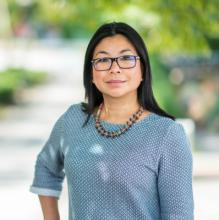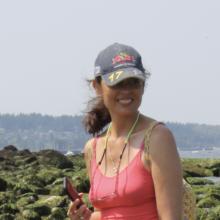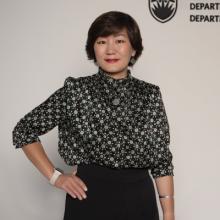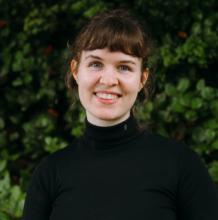As genetic technologies underlie many important public debates and promising medical advances, Karissa strives to bridge the gap between the lab and the public, by engaging with people about genetic techniques and tools in an approachable, accessible way. Karissa's own research focuses on trying to understand the way DNA damage influences cancer cells by recreating that same damage in yeast DNA.
Research Description
DNA is the 'program' that tells the cells in our bodies how to act. When DNA is modified or changed, the cell will change too. This can be good; DNA changes create differences between people, for example. However, some changes give the cell dangerous traits, like dividing too much or becoming 'invisible' to the immune system, which we believe can push the cell to becoming a cancer. In fact, some DNA changes make the DNA more likely to gain even MORE changes, and this run-away effect is what we call genetic instability. Recently, scientists have gotten very good at finding the changes carried in a cancer cell's DNA, but we don't know which ones can create instability. By making the same changes to yeast DNA, and then watching to see if the yeast gain instability, we can start connecting the dots to identify the real genetic players in human cancer. In support of this project, I also hold a Roman M. Babicki Fellowship in Medical Research through the UBC Faculty of Medicine.
What does being a Public Scholar mean to you?
In the case of science especially, I think it means stepping down from the Ivory Tower. Scientific research is only valuable when it can be shared with the world, but we're in the habit of obscuring our work in jargon and huge documents. Universities are the birthplace of new knowledge, and Public Scholars focus on making these vast intellectual resources available and useful outside of the academic sphere, for the benefit of everyone.
In what ways do you think the PhD experience can be re-imagined with the Public Scholars Initiative?
The PSI represents the push to modernize doctoral programs, and I think that will take many forms. Already, the diversity of topics captured by this initiative demonstrates how flexibility in the format of a PhD opens doors for interdisciplinary study, and better captures the wealth of talents that can be fostered in progressive university-based communities. The PSI is our chance to elaborate on our doctoral work in ways that have previously remained unrecognized and often unsupported by our institutions. With academic career options dwindling, this will be our chance to lay the groundwork for our future careers, as well as connect with other students who share this passion for public connection and discourse.
How do you envision connecting your PhD work with broader career possibilities?
I would love to get involved with Canadian science policy, or with public communications for industry or medicine. I've always loved to write, and I think my perfect career would combine this with my deepening fascination with genetics. My program has taught me so much about how to interpret science and make it useful for myself; next, I want to make it useful for others.
How does your research engage with the larger community and social partners?
I am interested in using new media platforms for public engagement. This began with reaching out on Twitter and through blogging, but I am eager to explore additional options and venues for communication. As well, I will be working with the Genetics Society of America to organize an outreach event at The Allied Genetics Conference, which is coming up in 2016 in Orlando, FL. My ultimate goal is to become a trusted communicator, someone who can not only share concepts and cool research with the public, but also someone who can answer questions and rationally discuss topics related to genetics.
Why did you decide to pursue a graduate degree?
My undergraduate work at Dalhousie University involved working in several biology labs during my co-op placements and honours thesis work. I loved how being in a lab gave me the chance to learn in-depth about the most fundamental mechanisms of life, and I knew that a graduate degree would give me an even greater opportunity to explore the field of genetics.
Why did you choose to come to British Columbia and study at UBC?
My first co-op placement was at the BC Cancer Agency Deeley Research Centre in Victoria, and was my first time visiting the west coast of Canada. I immediately fell in love with BC, and decided to begin my search for a graduate program in this province. When I learned about the GSAT program at UBC, which focuses on research experience and skills diversity over class time, I knew this was the right school for me.




